- Home
- Claire North
Notes from the Burning Age Page 3
Notes from the Burning Age Read online
Page 3
“You have to find Vae,” Yue muttered as we lay on the stretchers, batting away her oxygen mask. “I was looking after her.”
As children, we look to adults to be perfect and say the right thing. Mama Taaq, face streaked grey from dust and tears, should have replied to her shivering, shuddering child: “You did everything right, my darling. You did everything you could and none of this is your fault.”
Later she would say those words, but later was too late, because that night all she did was cry and turn away from her still-living daughter to try and find her dead one. These things are entirely natural and understandable – just not to a child.
We were still in the hospital in Tseonom when they found Vae’s body, washed nearly seven kilometres downstream. They told the children she looked very peaceful, and when alone in the bathhouse I slipped beneath the water and held my breath until my throat spasmed and my face burned and my chest was a cavity swallowing me from the inside out, and then surfaced, and realised I would never believe anything an adult said ever again. I ran to my hearth and hid behind the rainwater butts and was angry, sullen, resentful, whimsical, manic, full of laughter and profoundly sad, until at last my mother grabbed me by the shoulders as I ran down the path shaded with hanging vines and managed to hold me still long enough to say: “My child lived!”
In a strange way, it had not occurred to me that night that, though one family had lost their daughter, another’s son had been saved. It had not occurred to me to be grateful that I was still alive. The next day, we climbed the burnt hill to the plot of earth where Vae’s body had been laid for the forest to take her, and my mother spoke of the cycle of all things, as the Medj do, of change as truth and death as inevitable, of there being no life where there was not its ending, and then said the one thing that the Medj always seemed to forget to add at the end of their sermons: “And it is all right to be sad about that.”
Yue vanished into her room for the rest of the summer, and neither family nor friends could coax her out. They did not try very hard. People are rarely skilled at dealing with other people’s pain. Do you carry on as if nothing had happened, or do you find yourself guilty that you were caught smiling, that you played a game a week after the funeral, or laughed at a joke a month after Vae’s body was given to the sky and earth, or did your homework and made a meal because life continues? Grief never leaves, but life layers itself on top of the pain, time forming fresh scabs over bleeding wounds, no matter how much we wish we had stayed in the burning forest.
So summer ended, and life went on, and Yue went back to school. And sometimes she cried. And sometimes she laughed. And the teachers said she should talk to a counsellor, and she did, and the counsellor told her parents afterwards that there was nothing remarkable here, nothing extraordinary or strange. There was a child grieving; that was all there was to it. You do not fix grief; there is no pill. You only wait, and be there, and let time pass.
So we waited, and let time pass, and Yue’s grief did not become a performance, did not become an all-consuming thing that defined her. There was too much life to be lived for that to be the sole quality of her nature. Instead, her thirteenth birthday came and went with some merriment and a little quiet, and then her fourteenth, and sometimes she caught my eye in the street and looked away, and I was still a child, still ashamed, so I turned my face from her too and went about my business as if neither she nor Vae had ever played with me in the forest.
Two years after the forest burned, the Medj of the town, bundled in patched beige robes, led the village up to the stump of the kakuy tree to plant fresh ferns in the ash-soil. The summer festival of Tinics had always been one of dancing, of games and competitive music-making, in which the most beautiful ballads had competed with those less tuneful souls who understood that an entertained audience was more likely than a moved one to crown you with a garland of flowers. After the fire, the festival had moved into the temple grounds, and we washed our hands in the little pools of water between the pebble rows and gave thanks to the food gifted us by the nearby towns that understood our loss. The priests spoke of the cycle of all things, and of how all things came back to life, and there had not been any dancing.
The next year, the elders of the village took hands with the youngest ones and circled the remnants of the hornbeam four times one way, then four times the other, then we all spread out to plant our offerings to the forest, and the soil was black as night and parted beneath my fingers at the lightest touch, eager to be fed.
That same night, when the adults were in the town making merry by precious citronella candlelight, Yue returned to the forest. With headtorch on her head and a water bottle in her hand, she set off up the blackened path through the scrubby, chin-high trunks and drooping, soot-scared monuments, heading for the highest ridge. The new trees pushing up from the corpses of the old, arm-thin and pale-skinned, were not yet so tall that she couldn’t see her destination nor so frail that she couldn’t use them to climb, hand-over-hand, towards the rising moon. She was becoming the woman I would one day meet in the winter wood; an oblong of tight mouth and stern eyes beneath a winding braid of hair. Hers were features most suited for a laughing grandmother’s smile, and they would not fit easy with her until she reached that age.
Beneath the earth, roots tangled like lovers, one atop another, feeding the new green, and as the ferns uncoiled their fresh leaves and the ants nibbled at the fallen black trunks of yesteryear, the forest grew. Life had returned faster than anyone had expected. Not the old life; not the crows or the great rumbling bears, but the smaller, faster life that thrived in bracken and fern, that fed on the insects which thrived in sooty soil and loved to lick at dribbling nectar from freshly rising sap. For a few years, blooms of flowers had spread like rain, colours I had never seen before, yellows and oranges, pinks and lavenders, gaudy magenta and potassium blues verging on black. As the trees started to open their canopies again, the shadows would drive the flowers into smaller clumps of colour peeking at the light, the birds would return with their cackling and caws, and the wind would move the leaves in an old, familiar song. Perhaps then, the Medj said, the kakuy would bless us once again with their presence, and the fruit would grow ripe on the branches, and the wind would power our farms again, and our offerings would be rewarded with their grace, now that the hard years were over.
“When my tree carries fruit again,” Mama Taaq would say, standing beneath the grey branches of her spider tree, “then I will know the kakuy have returned.”
Her tree would not bear fruit for another four years, when the old hornbeam on the ridge finally flowered in spring. Within every living thing there is a kakuy; the soul of the stone polished by the sea, the spirit of the leaf turning crimson as it falls. All that lives must die, but death is not the end of living, and so the forest grew, and life found its path, and one day the great kakuy of the forest would walk again.
That night, Yue climbed up to an ebony monument to all that had been, a squatting shadow on the horizon. Even in death, the kakuy tree fed life: beetles and ants, fungus and moss creeping into every nook and corner, burrowing past the char to sup on the sap that had supped on the earth. Though the forest had crumbled, people still climbed to offer their tributes to the kakuy burned in fire. An apple, rotting, busily consumed by bugs. A fresh pink rose, propped up against the ravaged trunk where once Vae had climbed. A poem, folded, written in an archaic style and asking for romantic fortune and future wealth. A broken mask from some children’s play, left in gratitude for who knew what blessing. And there, still glinting through the blackened soot and thick grains of dirt that shrouded it, a little metal shard.
Yue turned her headtorch on to see it more clearly, held it up to the light, ran her fingers over the ridged, ancient words.
Product of China.
She considered it quite a while before laying it down on a scarred old stone and turning her attention to me. I had not been invited to this place, but I also knew what anniversary this
was, and Vae had been my friend. I had found my path to the burnt kakuy tree before Yue and stood next to it now, briefly defiant, for this was my night and my remembrance beneath the stars, and if Yue wanted to interrupt she should have come a year ago, when I first climbed through the dark of the ashen forest to mourn.
That defiance flickered out almost as soon as it had arisen, and for a moment there were just the two of us above the growing trees, fed by star and moon.
Now we stood, the pair of us, blinking in the dark, the light of her torch dazzling me as I flinched away from its glare. It took a moment for her to realise what the grimace on my face meant, and she turned off the beam and shuffled on the spot, momentarily dull as her eyes adjusted to the changing light.
Then we stood again a while, listening beneath the moonlight, as the forest grew.
She held out her hand, and I took it, and together we circled the fat, black stump of the kakuy tree once one way, once the other, and bowed together, hinging from the hips, and straightened up, hands finding each other again.
She did not look at me, nor I at her.
The forest grew, and the birds did not squabble in the sky, and after a little while Yue let go of my hand and walked away without a word.
That was twenty years ago.
Chapter 4
There is a cellar beneath an old block in the city of Vien that smells of malt and the sweat of men. One night there – or rather, one very early morning – I found myself sprawled along the long, sticky top of a bar as one man held down the back of my head and my bent left arm, pinning it against me with his own body weight, while another attempted to get a decent grip on my jerking, bucking right hand in order to cut my thumb off.
“No please please I can explain please it’s a mistake you don’t have to please…”
The cellar itself was a historical monument, reclaimed from the silt and crumble-down collapse of an ancient city, restored with stones plucked from the ruins of former monuments, buttressed with timber harvested by the Medj, who bowed to each tree in turn and made libations to the kakuy whose gift they were receiving. Dim yellow lanterns hung across the ceiling, powered by the solar batteries high above, and in each padded booth of low couch and table, a hollow was cut for the communal soup bowl, a heavy wooden board laid for the breaking of bread.
“Help, somebody help me!” I shrieked and gibbered, knowing perfectly well that I was the last in the bar, the keys to the front door in my pocket, the back door sealed. “Somebody help!”
During the day, the cellar hosted activities ranging from a meeting hall for monotheists, calling prayers to the old gods, to a twice-weekly knitting group, some of whose efforts were immortalised on the wall nearest the small stage where a dubious range of musical talent was occasionally demonstrated. Who knew you could knit a lobster? Not me.
At night, it had become a haven, first unofficially and then with a semi-official regularity, for members of Vien’s Justice and Equality Brotherhood, two of whom were now attempting to remove my digits with a blunt flick knife.
“Whatever you want I can do whatever you need I’m sorry I’m sorry I’m sorry…”
Working in the bar had not been my first choice. The hours were long, the pay merely adequate, and any naive notion I had of doing something with my daylight hours was usually lost to restless sleep as sunlight streamed through the shutters of the hearth I called home. My manager had recognised something desperate in me and, faced with the choice between offering me help or exploiting my vulnerability, had chosen the latter. He was now noticeably absent, and I couldn’t help but wonder if I would be berated for getting blood on the counter or not tidying up my own severed digits before locking up for the night.
The two gentlemen involved in the business of mutilation were learning on the job. The one who was holding me cheek-first against the countertop focused with a calm, almost bored, nonchalance on keeping my whole body pressed beneath the steady weight of his own, my wrist twisted in his grip. Meanwhile, his colleague tried to turn my right hand up, so that my thumb faced away from the rack of alcohol on the wall, locking my elbow to reduce any writhing to a limp fish’s flipper-flap. He was succeeding too, one twisted fibre at a time, so I fell back on screaming, wailing and pleas for mercy, laced with more than a bit of self-pity as I contemplated the poor life choices that had brought me to this place.
Then a voice said, “What’s your name?” and the third party to this escapade – a presence I’d barely noted until now – entered the conversation. His authority was enough to make his colleague pause in his work, the knife biting paper-cut thin into my joint.
“What?” I stammered. “I’m Kadri Tarrad, Kadri Tarrad, I live on Katalinastrasse, I’ll do anything, please!”
“Your name is not Kadri Tarrad,” tutted the voice, and perhaps there was a nod or an indication of displeasure at this conclusion, because the knife bit hard enough that I screamed:
“Ven Marzouki! My name is Ven Marzouki!”
The blade relaxed. I could feel blood running down my skin, spilling onto the bar, seeping through the thick, gloopy varnish into the wood.
“Where are you from, Ven Marzouki?”
“Lyvodia,” I whimpered. I was surprised to find that though I had some control of my breath and voice, there was salt in my eyes and a capillary pulsed in the side of my cheek with such power I felt sure anyone looking at me would see a relentless, pounding twitch.
“You’re far from home. Why did you lie?”
“I…” I tried to turn my head away from the sight of my own blood, couldn’t, closed my eyes and received a shaking of my skull for my efforts. “Whatever I’ve done to offend you, I’m sorry. You’ll never see me again.”
Another movement; another little signal somewhere outside my line of sight. The weight on my back relaxed long enough for hands to flip me round, now bending me concave, spine digging into wood, knife moving from my hand towards my throat. I caught a glimpse of face and eye, of assailants who were not in the mood for wit, then their boss rose from his chair, stepped around a small, round table, adjusted the collar of his coat and mused: “Are you a spy, Ven?”
“What? No. Please.” I was still struggling to steady my breathing. “Please just let me go. You’ll never see me again, I swear.”
“Why are you here?”
“I work here! I just work here, please.”
“Why here?”
“I don’t know! Because they gave me a job, they gave me a job! It’s not even a good job, please, whatever you think I’ve done I’ll make it right. I’ll leave, I swear by river and road.”
The man shook his head, disappointed. The lights in the bar were turned down for the evening, a slick yellow pooling like acid, but I knew his face from the endless Brotherhood meetings in the hall. He was a picture of archival masculinity: 190 centimetres of subtle muscle beneath an orange-brown winter coat; shoulders that ran in a well-defined V up through his neck to a square jaw, chin with a nook in it that seemed moments away from becoming another mouth with its own scowls and grins; eyes the colour of autumn; straight, pulled-back oak hair inclining to grey. His order at meetings was always the same – a glass of pricey white wine grown from the vineyards on the coast, followed by endless chasers of water and the occasional cold floral tea. When party members passed out drunk or vomited in the corner, he would apologise, gesture to others in the assembly, and have the offending drunkard removed and the mess mopped up while we staff looked on in silence, grateful to have clients who looked after themselves. That, until this moment, had been the limit of our interaction.
“You swear like a priest.”
I licked my lips, swallowed hard, tried to speak, fluffed the first few words, tried again. “I’ll leave Vien. I promise. You’ll never hear from me again.”
“But I want to hear from you. I want to hear all sorts of things from you. I want to hear about your past, your present, your future. I would like you and I to have a conversation.”
His enforcers were built to a different physical spec than his. Whereas his muscle was a careful construct of motion and control, theirs was the heavy wallop of gorged meat and slapping pain. His strength was merely one of many attributes he was proud of; theirs was the one thing in the world that gave them confidence.
“Are you going to turn me over to the guardia?” I wheezed, tongue an inelegant tool in a swelling mouth.
“Why would we do that?”
“I don’t know. Because you can?”
“Yes. I can.” He sounded almost kind; a disappointed uncle hoping that the vagrant child will have the guts to confess before the truth is dragged out with irons. “But perhaps there is another way.”
In the temple, as a child, the Medj told me that everything has a kakuy inside it, from the smallest pebble in the stream to the rolling black clouds that break on the tip of the mountain. I wondered what it would be like to be a kakuy of some small, thorny shrub, or the spirit of the cavern, and decided it would probably be better than this. Instead my very human form was deposited at a table in the corner of the cellar with the man who was to destroy everything, cradling a bloody thumb and a pounding skull, while he poured me a glass.
“Tell me about yourself, Ven. Kadri Tarrad. Whoever you pretend to be.”
“Why?”
“I hold your life in my hand. Isn’t that enough? ”
I took the offered glass, drained it down. It was the good stuff, the stuff my manager would be angry to find missing. “I used to be a priest. I was training to take the vows.”
“How did you go from chanting and waving incense around to tending bar here?”

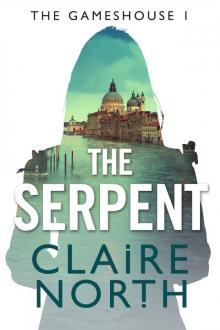 Gamehouse 01 - The Serpent
Gamehouse 01 - The Serpent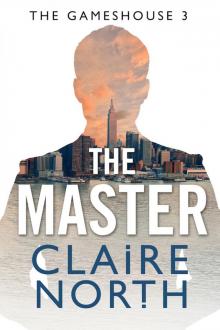 The Master
The Master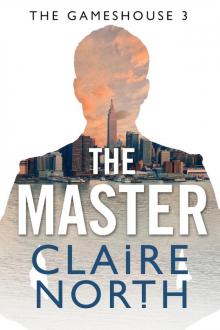 Gamehouse 03 - The Master
Gamehouse 03 - The Master The Thief
The Thief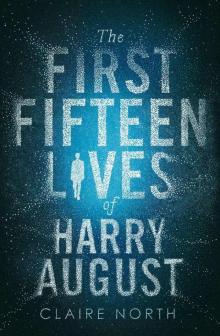 The First Fifteen Lives of Harry August
The First Fifteen Lives of Harry August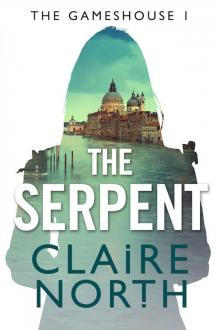 The Serpent
The Serpent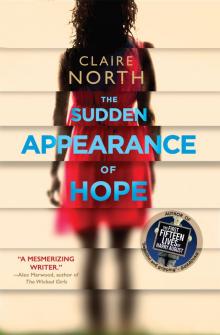 The Sudden Appearance of Hope
The Sudden Appearance of Hope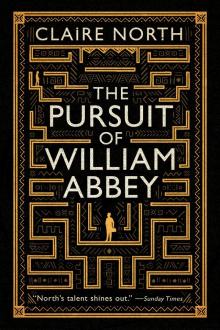 The Pursuit of William Abbey
The Pursuit of William Abbey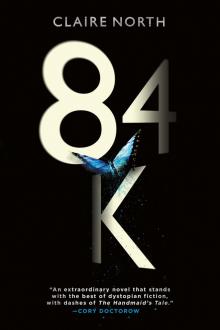 84k
84k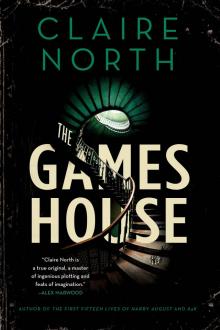 The Gameshouse
The Gameshouse Touch
Touch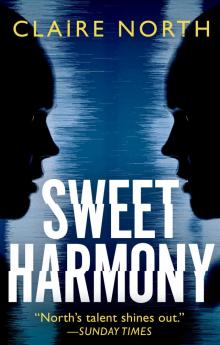 Sweet Harmony
Sweet Harmony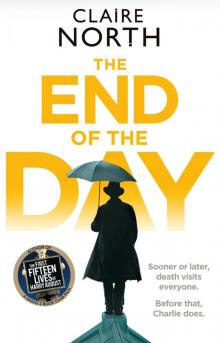 The End of the Day
The End of the Day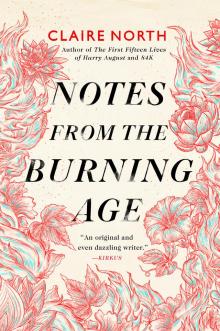 Notes from the Burning Age
Notes from the Burning Age